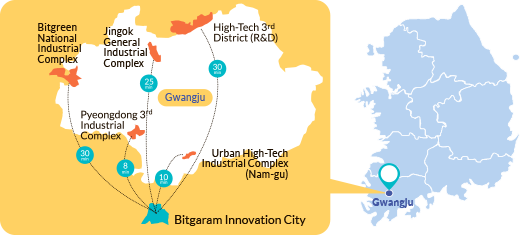
Since 2004, Gwangju has taken the reigns to become a leader in renewable energy
Next March, the Solar, Wind &
Energy Trade Fair 2018 is
scheduled to be hosted in
Gwangju, Korea’s sixth-largest
city. And it's no surprise that the country’s
biggest business fair for renewable energy
will take place there, as the region boasts
the highest level of insulation in the country,
making it an ideal test-bed for solar
energy companies. Gwangju now aims to
be the center of solar power and green
vehicles in Korea, even trademarking the
phrase 'Solar City Gwangju'.
Since tapped by the government in 2004
as one of the pioneering leaders of green
energy, Gwangju has taken the reins to
become a proactive leader in the field. It
became host to the Gwangju Innopolis, a
group of major government-funded
research institutes focused on the development
of new energy and industries related
to sustainable living, and the Bitgaram
Energy Valley, an ambitious project to
create "smart cities" run on clean energy.
For investors looking to be involved
with the development of renewable energy,
here are some promising areas in the
city of Gwangju.
Pyeongdong was designated as an
industrial complex in 1993 and completed
construction in 2010. Divided into two
complexes—the General Industrial
Complex and the Weoljeon Foreign
Investment Zone. Located within a 50-
minute drive to Muan International
Airport and two-hours to four different
ports (Gwangyang, Mokpo, Yeosu and
Gunsan Ports), Pyeongdong is logistically
well-balanced.
While the General Industrial Complex
is for tenants in traditional industries like
food, fiber and textile,

chemicals, metal, electronics and
shipping, the Weoljeon Foreign
Investment Zone was designated
as a, special area for foreign investors.
Preferably for investors in the home appliance
industry, design biomedical and
green vehicles, Weoljeon is expected to
produce KRW 1.8 billion (USD 1.58 million)
in exports.
As of March 2017, a third industrial
complex, covering 1,178,000 ㎡ is being
built to focus on environmentally-friendly
vehicles and clean energy. The KRW
225.3 billion (USD 197.59 million) project
will house electronic, metal and automobile
manufacturing companies. The project
will also further encourage cohesiveness
for the industrial complexes involved in
KEPCO's Bitgaram Energy Valley Project.
More than 140 companies are expected to
move in to the complex and create 11,503
jobs and an economic incentive of KRW
2.9 trillion (USD 2.54 billion).
The success of Korea Electric Power Corporation (KEPCO)'s massive Bitgaram Energy Valley project is hinged on collaboration with specialized complexes and research institutes. One of these major industrial complexes is the Jingok Industrial Complex, which was designated in 2007 and completed
March 2016. Bitgreen Industrial
Complex and the Pyeongdong Industrial
Complex also allows easy access to
human resources and collaboration among
businesses. Jingok Industrial Complex was
constructed as the manufacturing engine of
the Bitgaram Energy Valley project, and
tenants are well underway in building factories
in the area. The industrial complex
currently houses tenants related to electronic
parts, machinery and cars and
encourages companies in rubber, metal,
medical, electronics and automobile parts
industry. Major logistics companies like
Nexen L&C and Sunjin SCM have also
invested in the Jingok Industrial Complex.
In addition, the Gwangju Solar Energy
Service was established in Jingok to help
the city install some 11,707kW of photovoltaic
systems, 56,517 ㎡ of solar panels,
9,440kW of geothermal heat generators,
4,240kW of bioenergy and 282kW of fuel
cells to become Korea's first truly ecofriendly
city. Meanwhile, in 2011, the
Gwangju Green Car Promotional Center
was also established to cultivate environmentally-
friendly vehicles in the region.
The center promotes the advancement of
technology and industries related to automobiles
and plans new projects to further
promote the automobile industry.